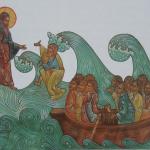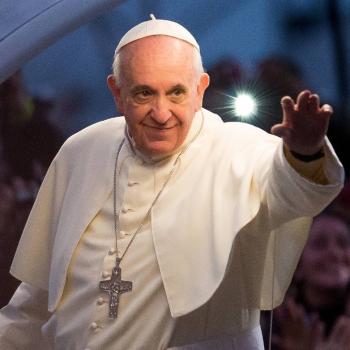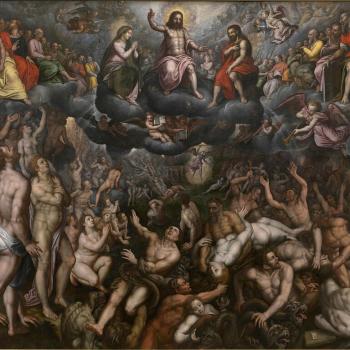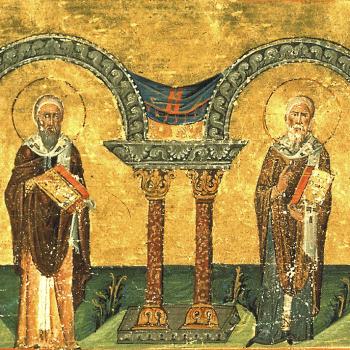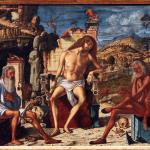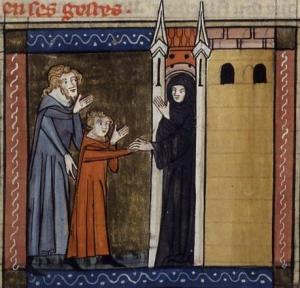
There is a great deal of confusion concerning the categories of sex and gender in the world today. In part, this is because gender has often been treated as the absolutization or essentialization of someone’s assigned sex at birth. Christians, if they look to Scripture and subsequent Christian tradition, should at least question such essentialization. There are indications in both which suggest that in the eschaton, in the kingdom of God, humanity will transcend all temporal sexual and gender designations. To be sure, not all hold such a view. There are those who think everyone’s sexual identity will remain in eternity, as they believe it is something essential to a person’s own identity, but believe sexuality (and with it, gender relations) relate merely to temporal concerns, concerns which no longer remain in the eschaton, and so will not be manifest in the resurrected body. Both eschatological conceptions have a place in Christian speculation, as neither have been condemned. As such, those who suggest in the resurrection, we will transcend gender, hold to some form of gender transformation, demonstrating that some notions of gender fluidity have had a place in Christian speculation, and they can be found not only in the modern era, but in the earliest eras of Christian theological discussion as well.
To be sure, many discussions concerning sexuality and gender from ancient sources relates, in part, to a world view, including an anthropology, which is as outdated as Ptolemy’s cosmology. As such, it would be fruitful to reengage such discussions using modern scientifical developments as a way to update our discussions. And yet, as in the case of cosmology, there are truths found in the ancient engagement of sexuality and gender which can be and should be embraced today. Not everything they said was wrong. Similarly, there are principles revealed to us by revelation which transcend human sciences, principles which remain true no matter what science shows to us, truths which must be accounted for as we try to discern the way revelation and science can and should work together. One such principle is exemplified by Paul when he said that in Christ, all the distinctions we have made to divide humanity are to be relativized in Christ: “There is neither Jew nor Greek, there is neither slave nor free, there is neither male nor female; for you are all one in Christ Jesus” (Gal. 3:28 RSV). It is in this spirit we can find some women ascetics (some who were also saints) who presented themselves as men in order to join various monastic communities, and when it was revealed they were women, usually after their death, they were not treated as if they had done wrong, but rather, what they did was seen as another part of their story and the way they became holy. Today, it would seem, if some women did that, and it was revealed what they had done, they would be looked down as being transgendered, and therefore, as sinners. Those who do so tend to believe there is no distinction between sex and gender, and so they think the sex someone was identified at birth should be how they should identify themselves all their lives, and if they do not, they are denying the truth about themselves, which is how and why they end up being seen as sinners. The way the ancient Christians treated such holy saints should lead us to call into question the way many moderns would treat them, because if they were recognized as being holy while presenting themselves as male, indeed, for that being one of the many reasons why they were able to become and be holy, despite being designated as women at birth, it would seem the fact that they are saints, and how they became saints, confirms their path contrary to modern gender essentializers.
Maksim Vasiljević, Bishop of the Eparchy of Western America of the Serbian Orthodox Church, shows us how our understanding of gender has become a problem in the modern era because of the way many have conflated gender with sex:
The specter of gender is one of the most persistent cultural problems. Many have entered into an alliance to exorcise this specter: conservative politicians, some clergy, radical intellectuals, and moralists of all kinds and fashions. On the other side, almost in the same number, are those who have embraced it, fashioning a romantic “gender identity” even a “theology of gender.” Clearly, this problem is partly due to the existing confusion between the concepts of sex (which is biologically based) and gender (which is psychologically based).[1]
Gender, Maksim Vasiljević explains, has a psychological element to it, and therefore, relates more to our personal relationships than our physical, or bodily, characteristics. Obviously, our bodies will have a role to play in our gender association, but, as our mind transcends our body, so our psychological understanding of ourselves will not be limited to our physical qualities. Instead, they will relate to who we are as persons, and so, how we relate to others. Our bodies will be involved in our self-understanding, but it is clear, other factors also will play a role in our gender identification. Once we appreciate this, then we will begin to understand the relative value of gender (and, possibly, one’s sexual identity) and why some important Christian thinkers established a Christian anthropology that ended up presenting the need to transcend all sex and gender distinctions. Engaging Sts. Maximos the Confessor and Gregory of Nyssa, Maksim Vasiljević points out that humanity in its proper, eschatological, form, reveals the relative or contextual element associated with sex and gender:
Together with Sts Maximus the Confessor and Gregory of Nyssa, we should stress that the basic presupposition of man’s true “being” is not found in his historical form, but only in his eschatological state, which is anticipated in the Holy Eucharist. Seen in Christological perspective, gender is not an absolute category, but rather, it exists in relation to something else – it is contextual. So, although gender-based relations in history are activated through nature, in the eschaton they will not be controlled definitively by nature, and equally important, they will be inactive and useless.[2]
Those who follow this line of thought can and will live it out in their lives, in and through their relationships with other people. This is because the eschaton is immanent in Christ; the eschaton is already and not yet in such a way that the eschatological character of humanity will at least begin to reveal itself in history, even if the fullness of that character will transcend history. That is because the eschaton transcends temporal existence while it also touches and influences it. This, perhaps, is one way we can understand the women who identified themselves as men in order to join and be actively involved in a monastic community. They represented the eschatological dimension of humanity as they understood it; they lived it out by demonstrating the relative nature of gender, as they were able to identify themselves as men despite their sexual identity at birth as being women.
Thus, going back to St. Gregory of Nyssa, we find that he believed that in the resurrection, the differentiation between the sexes, let alone genders, would no longer apply to humanity:
For this reason, let us not feel we must imagine in those changed by the resurrection the kind of [sexual] differentiation that human nature now necessarily has, in view of the succession of our descendants (although it is not possible to prove clearly that this will not be so, since we do not know what these things will be changed to by our transformation). But we have no doubt that then there will be one race including all, when all of us will become one body of Christ, formed by the one shape, since the divine image will illuminate us all equally; and we shall make it clear that what will be given to us in that change of our nature, in place of these present characteristics, will be better than any idea we can form by guesswork.[3]
This is not to say the resurrection will be bodiless, and that is why we will find ourselves without such distinction, but rather, we will have our bodies, but they will be transformed in the resurrection so that they will no longer include all the coarse elements of their physical form:
Let not the body, then, be vilified by thoughtless people; after this life the soul will be adorned in a body that is transformed into a more divine state through regeneration, when death has purified it of what is superfluous and useless so that it can enjoy the life to come. [4]
Gregory, and those like him, wanted to follow what Jesus said about the resurrection, that is, humanity will be spiritualized and made like angels: “For when they rise from the dead, they neither marry nor are given in marriage, but are like angels in heaven” (Mk. 12:25 RSV). Angels are spiritual beings, not sexual beings, and so they do not have sex or gender. Following this line of thought, many have come to believe that humanity, in its transfigured, spiritualized state, will become like angels, and that means, their bodies will be transformed so that they no longer will have sexual qualities associated with them. Humans will be able to thrive just as angels thrive, having new, greater ways to engage intimacy and love; what was good and true in the physical form will remain, even if it is transformed into a new asexual or agendered state. If we follow this line of thought, one which many in the ancient world held, the resurrection can be said to lead everyone to a trans-gendered status, as the genders and all gender roles will be transcended and overcome. And if this is the case for humanity in the resurrection, in the eschatological kingdom of God, then as the eschaton touches history, we should not be surprised to see the effects of this in history and historical relationships, showing at least, the kind of fluidity necessary for gender if we are going to find ourselves changing from our current gender status to one which transcends all gender in the resurrection. And, one can say, this fluidity is what allowed those who were identified as women at birth to identify themselves and live out their lives as men. If we see ancient Christians could intuitively grasp this, and so accept such fluidity in their day, Christians should be able to engage such considerations today when trying to understand gender (and sexual) concern. Of course, those who do not hold this view, should at least recognize the potential of it in the Christian tradition, instead of instantly believing those who follow such a position runs contrary to the Christian tradition, because that is something which has yet to be absolutely denied by those who have the authority to do so.
[1] Maksim Vasiljević, Theology as a Surprise (Yonkers, NY: St Vladimir’s Seminary Press, 2018), 103.
[2] Maksim Vasiljević, Theology as a Surprise, 117.
[3] St. Gregory of Nyssa, “A Discourse on the Dead” in On Death and Eternal Life. Trans. Brian E. Daley (Yonkers, NY: St. Vladimir’s Seminary Press, 2022), 31.
[4] St. Gregory of Nyssa, “A Discourse on the Dead,” 28.
Stay in touch! Like A Little Bit of Nothing on Facebook.
If you liked what you read, please consider sharing it with your friends and family!
N.B.: While I read comments to moderate them, I rarely respond to them. If I don’t respond to your comment directly, don’t assume I am unthankful for it. I appreciate it. But I want readers to feel free to ask questions, and hopefully, dialogue with each other. I have shared what I wanted to say, though some responses will get a brief reply by me, or, if I find it interesting and something I can engage fully, as the foundation for another post. I have had many posts inspired or improved upon thanks to my readers.



